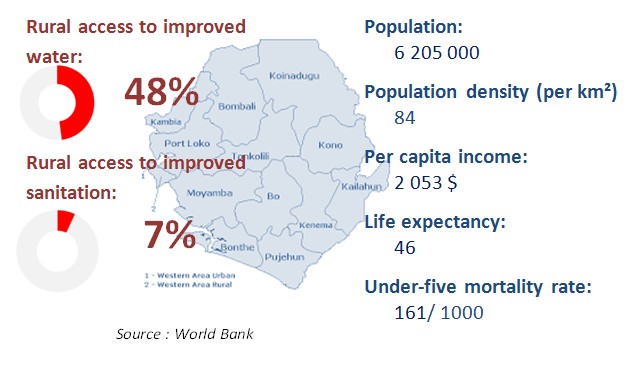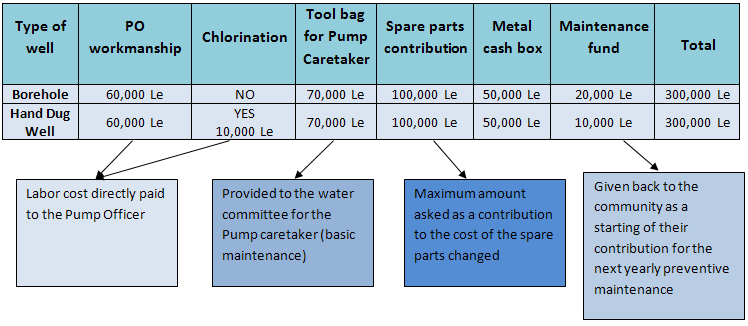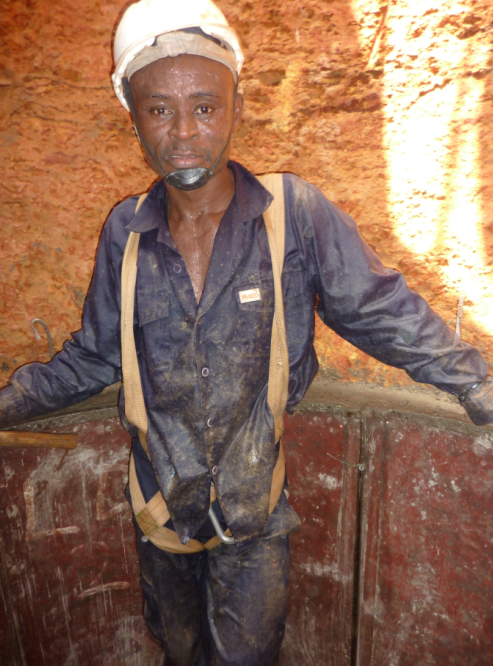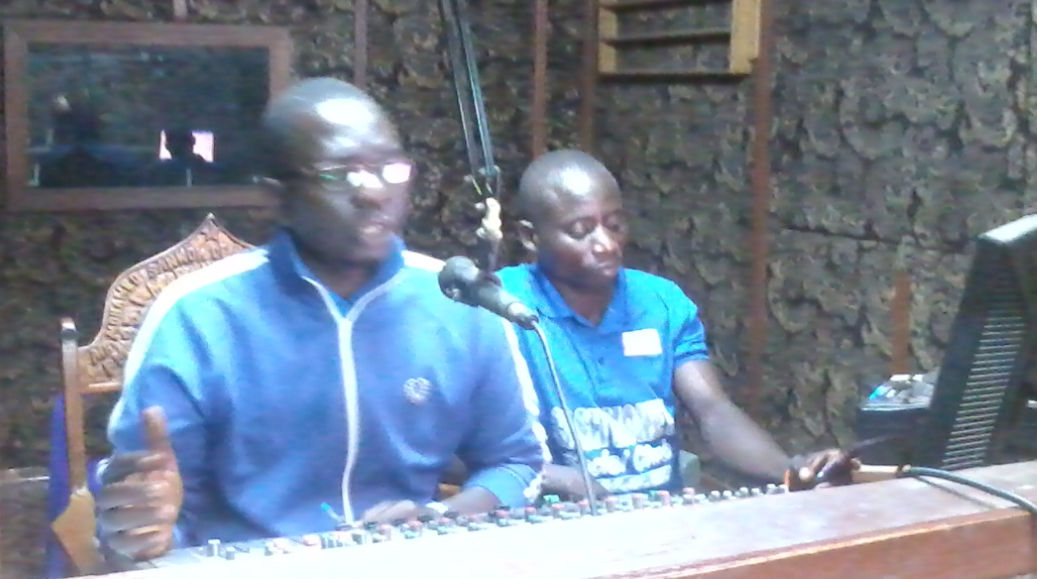The following tool indicates how many spoon to add (the images are helpfull for non litterate people)
Author Archives: Mathieu
General social data and situation concerning access to water and sanitation facilities in Sierra Leone
Understanding one of the main causes of wells’ drying in Sierra Leone, through an analysis of a water table movements.
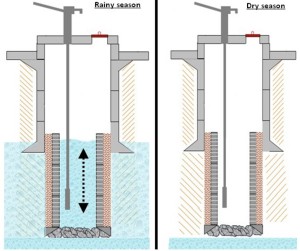
Season well (getting dry in dry season with water table movements)
Why hand-dug wells should only be dug in a specific period of the year, corresponding to low aquifer level?
From a technical point of view, hand-dug well drying is often due to the fact that the pumping system does not draw deeply enough or that the well itself has not been dug enough. This is typically the case of structures dug outside of the low water level period, so the bottom of the column dries up with the movement of the water table during the dry season.
An analysis of 29 consecutive months records, collected to measure the variations of the water table level in relation with the rainfall evolution, clearly illustrated the importance of timing the sinking of a well to correspond to low aquifer levels.
www.interaide.org/pratiques/sites/default/files/wells_drying.pdf ![]()
1st shot, repairs and preventive maintenance
First shot = initial repair = entry point in the strategy
Once the water committee is trained, it is left to the community organizing itself to gather the conditions requested for an Inter Aide intervention on their pump. These conditions are the following: contribution of Le 300,000, fencing of the well[1] and cleaning of its environment: as some pumps are broken down beyond the community’s ability to pay the full cost, Inter Aide only subsidizes this first intervention.
Depending on the work to be done, this operation lasts on average one full day and aims at repairing and upgrading the hand pump (replacement of any galvanized parts by stainless ones). The following steps are respected:
- Preparation at the office of the spare parts needed according to the diagnose form. Spare parts delivery on site
- Introduction meeting to remind the community about the purpose of this visit
- Repair of the pump by the Pump Officer under the supervision of Inter Aide.
- Receipt of intervention filling: for any intervention, the technical team must fill it with the list of the spare parts changed, the amount of money collected and the purpose of the money. This receipt is filled in 2 copies: one for the office and the other one for the water committee. Final meeting with water committee and community members.
- Delivery of tools and documentation: after the first shot, the pump caretaker receives the tools provided by Inter Aide for his basic maintenance work. A metal cash box is also provided to the committee to secure the money collected.
[1] The fencing can be locally made with sticks at first. Once the first shot is done, Inter Aideproposes to the communities a strategy to build a concrete fence: if the community provides mud blocks and 2 bags of cement then the program provides also 2 bags of cement. With 4 bags, the village has enough cement to seal the blocks and to plaster the fence all around to reinforce it.
Regular repairs :
The cost of the workmanship for the Pump Officer depends on the type of repair:
- Minor repair is an intervention focused only on the hand pump head assembly (changing of bearings, chain, etc.) The Pump Officer does not need to dismantle the entire system. In this case his workmanship is Le 40,000.
- Major repair is an intervention where the entire hand pump has to be dismantled (changing of cylinder valve, connecting rod disconnection, etc.). In this case the Pump Officer workmanship is Le 60,000.
Preventive maintenance :
Once the first repair has been done, the next main challenge is to encourage the communities to enter in a regular maintenance scheme of their pump. To ensure the sustainability of their facility and avoid major and expensive repairs, a yearly preventive maintenance of the pump by their Pump Officer in charge is highly recommended.
A preventive maintenance consists in dismantling the entire pump in order to achieve a complete diagnosis of the system. Once a year, the Pump Officer books a date for this intervention with the committee. All the parts are checked, cleaned, greased and replaced if necessary in order to ensure a proper functioning until the next maintenance the year after.
Water quality monitoring: protocol for tracking coliforms
 Coliform bacteria are a commonly used bacterial indicator of sanitary quality of foods and water. They can be found in the aquatic environment, in soil and on vegetation; they are universally present in large numbers in the faeces of warm-blooded animals, and their presence is used to indicate that other pathogenic organisms of fecal origin may be present.
Coliform bacteria are a commonly used bacterial indicator of sanitary quality of foods and water. They can be found in the aquatic environment, in soil and on vegetation; they are universally present in large numbers in the faeces of warm-blooded animals, and their presence is used to indicate that other pathogenic organisms of fecal origin may be present.
Therefore, after a campaign of new water points construction or for rehabilitation, Inter Aide is doing water analysis to confirm that the water is safe for drinking and that the improved water point will prevent people to be affected by water related diseases.
 portable kits (such as DelAgua kits)[1]that allow simple and reliable measurements that can be done on site or in a local simple laboratory (clean dedicated room).
portable kits (such as DelAgua kits)[1]that allow simple and reliable measurements that can be done on site or in a local simple laboratory (clean dedicated room).
[1] Other devices than Del Agua kits can be used such as Potatest (Wagtech).
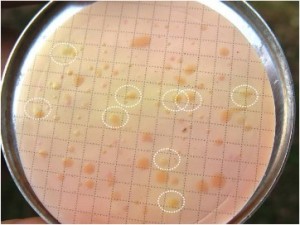
Picture of a Petri Dish culture with development of thermotolerant coliforms : what we want to avoid !
The following note in the link hereafter is the protocol Inter Aide is using to proceed to bacteriological tests.
www.interaide.org/pratiques/sites/default/files/ia_sierra_leone_water_tests_guidelines_2010.pdf ![]()
When we talk about the project in other media…
 The pS-Eau published in its newsletter of january 2014 an article (in French !) presenting our maintenance projects in some of the countries of intervention of Inter Aide: Sierra Leone but also Malawi and Ethiopia…
The pS-Eau published in its newsletter of january 2014 an article (in French !) presenting our maintenance projects in some of the countries of intervention of Inter Aide: Sierra Leone but also Malawi and Ethiopia…
Security rules for hand-dug wells constructions or rehabilitations
The document in link lists general guidelines and advises for ensuring security, both for workers and villagers, while hand dug well construction.
www.interaide.org/pratiques/sites/default/files/security_rules_and_site_management_191214_0.pdf ![]()
Definitions of the maintenance
The note in link put forward the concept of maintenance and the distinction that can be done between preventive or corrective maintenance and rehabilitation. It highlights notions of regular care and diagnosis for water systems in rural areas (not only for SIerra Leone !) for gravity schemes, wells and boreholes equipped of hand pumps).
www.interaide.org/pratiques/sites/default/files/definitions_of_the_maintenance_-_april_16_2013.pdf ![]()
3. Policies and strategies
This combines elements from the PRSPs of 2005 and 2008, and Sierra Leone Vision 2025, statements on achieving the Millenium Development Goals, and more general commitments to achieving a high quality livelihood for the people of Sierra Leone, attaining good governance through the rule of law, and developing a strong and competitive economy.
It is in an echo to the Sierra Leone‘s Third Generation Poverty Reduction Strategy Paper (PRSP 2013 – 2018 “Agenda for prosperity”) that includes improvement of water supply in its third pillar “Accelerating Human Development” .
www.sierra-leone.org/Agenda 4 Prosperity.pdf
The PRSP III outlines the lack of public awareness of the need to manage water resources and the lack of participation and capacity in the management of water resources at national, provincial, district and community levels, which take account of gender concerns.
Among the strategies and objectives planned in the PRSP it is proposed to encourage capacity building efforts to make available the knowledge and the skills necessary to manage water resources at various levels.
The National WASH Policy advocates for:
=> Promotion and scaling up of community led total sanitation concept and open defecation free communities concept.
=> meaning increasing communities’ participation in financing their water supply programmes and communities’ obligations for paying for operations and maintenance costs
National WASH Policy Final 2010 N.B. : These descriptions will have to be updated as the WaSH sector is moving in Sierra Leone and Institutions might be re-organised… |
Radio discussions for promotion of hand pump technicians and preventive maintenance
The team has been invited by the local radio (radio Okentu) to explain the strategy of maintenance, its objectives, why it is important for the communities to adopt such strategy. It was also the opportunity for some representatives of the hand pump technicians to talk about their job, explaining to the audience that they can intervene for repairs but also for regular visits to control the pumps and proceed to the routine maintenance.
They answered to some questions of the listeners.
Listen to the records here (a bit of notions of Kryo should be required though).
The team also talked about household water treatment and chlorination.


